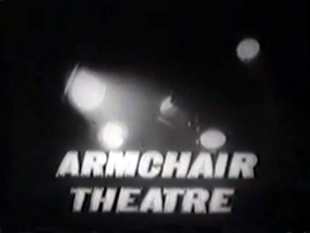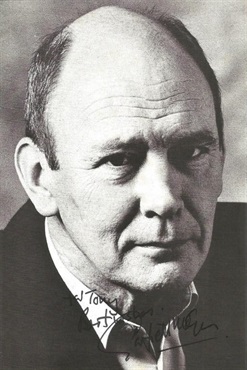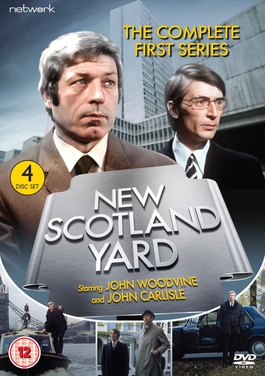Related Research Articles

Verity Ann Lambert was an English television and film producer.

The Sweeney is a 1970s British television police drama focusing on two members of the Flying Squad, a branch of the Metropolitan Police specialising in tackling armed robbery and violent crime in London. It stars John Thaw as Detective Inspector Jack Regan and Dennis Waterman as his partner, Detective Sergeant George Carter. It was produced by the Thames Television subsidiary Euston Films for broadcast on the ITV network in the UK between 2 January 1975 and 28 December 1978.
Euston Films is a British film and television production company. It was originally a subsidiary of Thames Television, and operated from 1971 to 1994, producing various series for Thames, which were screened nationally on the ITV network. Euston Films productions include Van der Valk (1977), The Sweeney (1975–1978), Minder (1979–1994), Quatermass (1979), Danger UXB (1979), and Reilly, Ace of Spies (1983). The Sweeney had two feature film spin-offs, Sweeney! and Sweeney 2, which were also produced by Euston.
Quatermass is a 1979 British television science fiction serial. Produced by Euston Films for Thames Television, it was broadcast on the ITV network in October and November 1979. Like its three predecessors, Quatermass was written by Nigel Kneale. It is the fourth and, to date, final television serial to feature the character of Professor Bernard Quatermass, this time played by John Mills.

Play for Today is a British television anthology drama series, produced by the BBC and transmitted on BBC1 from 1970 to 1984. During the run, more than three hundred programmes, featuring original television plays, and adaptations of stage plays and novels, were transmitted. The individual episodes were between fifty and a hundred minutes in duration. A handful of these plays, including Rumpole of the Bailey, subsequently became television series in their own right.

The Wednesday Play is an anthology series of British television plays which ran on BBC1 for six seasons from October 1964 to May 1970. The plays were usually original works written for television, although dramatic adaptations of fiction also featured. The series gained a reputation for presenting contemporary social dramas, and for bringing issues to the attention of a mass audience that would not otherwise have been discussed on screen.

Armchair Theatre is a British television drama anthology series of single plays that ran on the ITV network from 1956 to 1974. It was originally produced by ABC Weekend TV. Its successor Thames Television took over from mid-1968.

Theatre 625 is a British television drama anthology series, produced by the BBC and transmitted on BBC2 from 1964 to 1968. It was one of the first regular programmes in the line-up of the channel, and the title referred to its production and transmission being in the higher-definition 625-line format, which only BBC2 used at the time.

George Markstein was a British journalist and writer of thrillers and teleplays. He was the script editor of the British series The Prisoner for the first thirteen episodes, and appeared briefly in its title sequence. Markstein also wrote for or story-edited other television series, specialising in espionage stories, and jointly ran a successful literary agency for screenwriters.

George Sewell was an English actor, best known for his television roles, but also active on stage and in films.

Special Branch is a British television series made by Thames Television for ITV and shown between 1969-1970 and 1973-1974. A police drama series, the action was centred on members of the Special Branch counterintelligence and counterterrorism department of the London Metropolitan Police. The first two series starred Derren Nesbitt, before the programme went through an overhaul, with George Sewell taking over as the new lead.
Dennis Vance was a British television producer, director, and occasional actor.

Thomas Timothy Garfield Morgan was an English actor who appeared mostly on television and occasionally in films.

Out of This World is a British science fiction anthology television series made by the ITV franchise ABC Weekend TV for ITV. It was broadcast on ITV in 1962. A spin-off from the Armchair Theatre anthology series, each episode was introduced by the actor Boris Karloff. Many of the episodes were adaptations of stories by science fiction writers including Isaac Asimov, Philip K. Dick and Clifford D. Simak. The series is described by the British Film Institute as a precursor to the BBC science fiction anthology series Out of the Unknown, which was created and produced by Out of This World creator Irene Shubik after she left ABC.
Richard Harris is a British screenwriter and playwright, most active from the early 1960s to the mid-1990s. He wrote primarily for the crime and detective genres, having contributed episodes of series such as The Avengers, The Saint, The Sweeney, Armchair Mystery Theatre, and Target. He has helped to create several programmes of the genre, including Adam Adamant Lives!, Man in a Suitcase, and Shoestring.

Sweeney! is a 1977 British action crime drama film and extension of the ITV television series The Sweeney which aired on ITV from 1975 to 1978. The film did well enough at the box office that a sequel, Sweeney 2, was released in cinemas in 1978.

New Scotland Yard is a police drama series produced by London Weekend Television (LWT) for the ITV network between 1972 and 1974. It features the activities of two officers from the Criminal Investigation Department (CID) in the Metropolitan Police force headquarters at New Scotland Yard, as they dealt with the assorted villains of the day.

Jim Goddard was an English film and TV director who was born in Battersea, London. He directed episodes of many UK TV series such as Public Eye, Callan, Special Branch, The Sweeney, The Ruth Rendell Mysteries, The Bell and Holby City. He may be best known outside England for the TV series Kennedy starring Martin Sheen or directing the film Shanghai Surprise as a vehicle for newlyweds Sean Penn and Madonna.
Armchair Mystery Theatre is a 60-minute UK television anthology mystery series. Thirty-four episodes aired from 1960–1965. It was hosted by Donald Pleasence and produced by Leonard White. It was a spin-off from the successful Armchair Theatre series.
References
- ↑ Williams, John. "Euston Films". BFI Screenonline.
- ↑ Gilbert, Pat (2010). Shut It!: The Inside Story of The Sweeney. Aurum Press. p. 55. ISBN 9781845136604 . Retrieved 30 January 2019.
- 1 2 Collins, Frank (15 October 2011). "Armchair Cinema: Regan (Pilot for the Sweeney) / Blu-Ray Review". Cathode Ray Tube.
- ↑ "DVD Review: Armchair Cinema". Adventures in Primetime. 28 October 2009.
- ↑ Duguid, Mark. "Armchair Theatre (1956-1974)". BFI Screenonline.
- ↑ Williams, John. "Special Branch (1969-74)". BFI Screenonline.
- 1 2 "Armchair Cinema". DVD Compare.
- ↑ Clark, Anthony. "Sweeney, The (1975-78)". BFI Screenonline.
- ↑ "Armchair Cinema (1973-1975)".
- ↑ Adapted by Geoffrey Gilbert.
- ↑ The pilot episode for the police drama series, "The Sweeney" which ran for 4 series between 1975-1978.
- ↑ Originally scheduled for 28/5/1975.
- ↑ "Regan". World of Books. 12 September 2005.
- ↑ "Armchair Cinema Collection". World of Books. 31 August 2009.